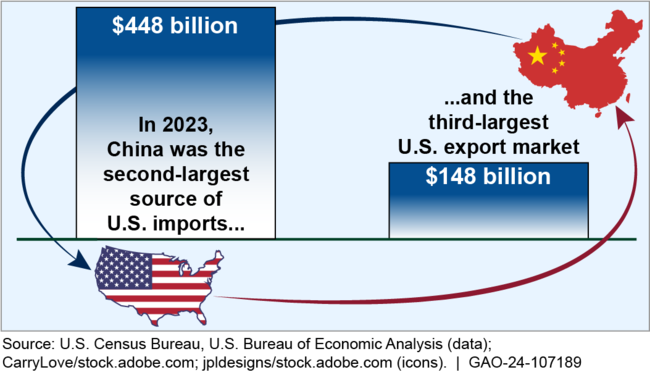China: Managing the Economic Relationship Requires Balancing Benefits and Risks
Fast Facts
China is a major economic partner of the U.S. but engages in unfair trade practices. These practices include trade in illicit goods, use of forced labor, and theft of sensitive technologies—which can all harm the U.S. economy. As China's economic power grows, federal agencies can act to better protect the economy.
This Snapshot report summarizes steps policymakers can take to further improve federal efforts to combat these practices. For example, better workforce planning can ensure agencies have enough staff with the right skills to review foreign investment transactions and enforce import restrictions on goods made with forced labor.

Highlights
The Big Picture
Trade and investment between the U.S. and the People’s Republic of China (PRC) have grown immensely in recent decades.
In 2023, PRC was the second-largest source of U.S. imports and the third-largest U.S. export market, according to the U.S. Census Bureau and the U.S. Bureau of Economic Analysis. In 2022, PRC-based foreign direct investment in the U.S. totaled almost $29 billion, and U.S. direct investment in PRC was $126 billion, according to the U.S. Bureau of Economic Analysis.

But PRC is also a major competitor, and the U.S. Trade Representative warned that “China routinely deploys economic and trade policies and practices that promote unfair competition and state-directed outcomes rather than fair competition and market-based outcomes.”
These practices include trade in illicit goods, use of forced labor, and theft of sensitive technologies.
Our extensive work in this area has identified actions that federal agencies should take to ensure that their workforce, information-sharing, data collection, and decision-making processes address these practices.
The U.S. government has programs to mitigate these economic security risks while maintaining an open investment climate and protecting the robust and codependent trade relations on which America’s prosperity relies.
- Export controls are used to manage risks associated with exporting sensitive technology, while protecting contributions of foreign scholars.
- Tariffs that protect U.S. industries from certain PRC trade practices have exclusions to mitigate potential harm to U.S. companies and workers.
- Import restrictions are enforced to stop illicit trade, which threatens to harm the U.S. economy and consumer safety.
What GAO’s Work Shows
We made numerous recommendations to bolster policymakers’ efforts to combat PRC’s harmful and unfair economic practices.

Workforce planning can help ensure agencies have enough staff with the right skills to enforce import restrictions on goods made with forced labor.
The Executive Branch committee authorized to review certain foreign investment transactions that can result in foreign control of a U.S. business faces resource limitations due to its growing workload and the complexity of the transactions it reviews.
Resource assessments are crucial to ensuring the committee’s effectiveness. Agencies still need to determine whether legislation is required to address security concerns posed by some foreign investments.

Targeted outreach to universities is a key enforcement mechanism to prevent unauthorized transfer of sensitive technology to PRC. Agencies still need to establish mechanisms to periodically assess risk factors used to prioritize universities for such outreach.
Additional guidance can support university efforts to properly safeguard export-controlled items and comply with export controls, but agencies still need to ensure they consistently interpret regulations.
Better public communication can strengthen enforcement of prohibitions on importing goods produced by forced labor, such as seafood.
Improved information sharing with companies can strengthen enforcement of prohibitions on importing counterfeit goods. Agencies still need to evaluate the effectiveness of their enforcement efforts.
Agencies need to enhance policies, such as conflict of interest procedures, to help mitigate threats of foreign influence in federally funded research.

Agencies still need to take steps to enhance data collection and sharing on foreign investments in agricultural land to increase the visibility of potential security risks.
Improved data on students from countries of concern, such as PRC, can strengthen efforts to identify and assess technology transfer risk.
Enhanced data analysis of duties collected to remedy unfair trade practices can help identify risks, and agencies still need to take further steps to mitigate nonpayment risk.

We found that consistent and timely decisions are needed on company requests for exclusion from certain tariffs on imports from PRC that protect against excess global supply. Agencies still need to take steps to minimize errors in requests and improve timeliness.
Public guidance to companies requesting relief from paying certain steel and aluminum tariffs should be complete and up-to-date, and agencies still need to create a policy to update their guidance.
Challenges and Opportunities
Despite recent declines in its economy, PRC’s power continues to grow. Experts have warned that PRC’s ambitious infrastructure investments and role in implementing development programs may expand its global economic and political influence. For example, its “Belt and Road Initiative,” sometimes referred to as the New Silk Road, is designed to link global trade routes through physical infrastructure. PRC-based companies dominate supply chains for both critical minerals and everyday goods, and recent disruptions have highlighted subsequent vulnerabilities, such as product shortages and inflationary pressures.
To protect a fair and open economic system, the U.S. must balance the benefits and risks of trade and investment with PRC. Policymakers continue to combat economic risks through actions such as preventing theft of sensitive technologies, strengthening import prohibitions on goods made with forced labor, and reviewing potential national security risks of PRC-based ownership of agricultural land. With continued focus, policymakers can further enhance these efforts to counteract PRC abuses and enforce rules against unfair trade and labor practices.
For more information, contact Kimberly Gianopoulos, Director, International Affairs and Trade at (202) 512-8612 or GianopoulosK@gao.gov.
